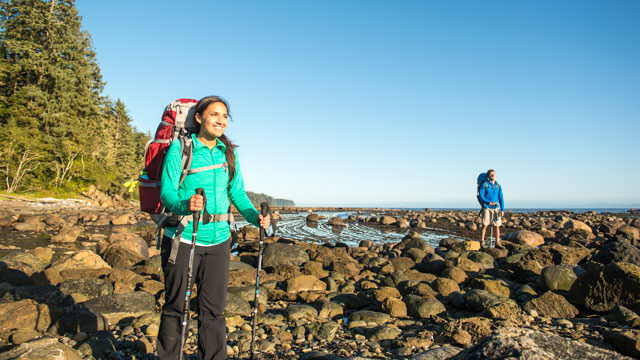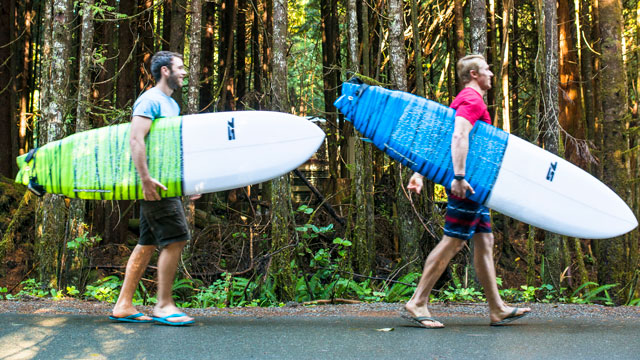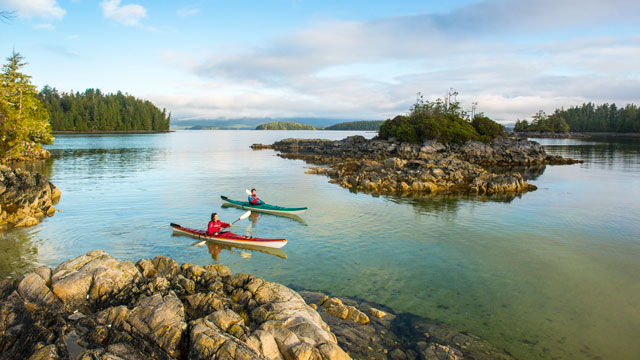
Activities and experiences
Pacific Rim National Park Reserve
Steeped in Nuu-chah-nulth culture, Pacific Rim National Park Reserve is your gateway to the rugged west coast of Vancouver Island. Activities range from interpretive walks to the hike of a lifetime along the legendary West Coast Trail.

The West Coast Trail : hike of a liftime
The 75-kilometre West Coast Trail follows winds through old-growth forests, past wide-open beaches and across suspension bridges spanning rivers and stream.

Catch a Wave : West Coast Surfing in Pacific Rim
Suit up in neoprene and take a surf lesson from a local surf instructor. Catch some waves off Canada’s west coast and join the cold water surfing world.

Broken Group Islands
Enjoy a day or overnight adventure in the sheltered bays and shell beaches of Barkley Sound. The islands are only accessible by boat.

Explore the ʔapsčiik t̓ašii - on foot, stroller, wheelchair, or bicycle
ʔapsčiik t̓ašii multi-use pathway extends 25 km from the southern to the northern boundary of the Long Beach Unit.

First Nations cultural experiences
Pacific Rim National Park Reserve and First Nation partners are working together to share Nuu-chah-nulth history, traditions, and culture with visitors.
Beach Fires
In an effort to reduce the impact of beach fires on the environment as well as other visitors, Parks Canada is asking national park reserve visitors to use clean burning or reduced smoke fire appliances in areas where beach fires are permitted. A clean burning or reduced smoke fire appliance is one that uses propane or dry firewood, is raised off the ground, and that allows air to be introduced either mechanically or through ventilation openings.
National park reserve visitors with a valid National Park Entry Pass are authorized to have beach fires in Pacific Rim National Park Reserve only in the following locations:
- Long Beach Unit
- Florencia Beach
- Wickaninnish Beach
- Radar Beaches
- Broken Group Islands Unit
- All beaches
- West Coast Trail Unit
- All beaches (Excludes: beaches between 34 km and 38 km)
Beach Fires are not permitted on:
- Long Beach between the bottom of Schooner Trail and Sandhill Creek on Combers Beach
- Swim Beach on Kennedy Lake
- West Coast Trail: beaches between 34km and 38km
All beach fires are subject to the following conditions:
- Pacific Rim National Park Reserve encourages the use of clean burning or reduced smoke fire appliances in areas where beach fires are permitted.
- Fire sites must be a minimum of 3m from drift logs, the forest, overhanging vegetation and structures;
- Fires are prohibited in the forest and in sandy areas with evidence of root systems underneath;
- Fires must be less than 1m in diameter and less than 1m high - small enough to put out quickly and completely;
- Fuel may only consist of purchased firewood or driftwood found on beaches below the high tide line that is small enough to burn down completely to ashes;
- Fires must be burnt to ashes and extinguished with water until cool to the touch (do not bury with sand unless in an emergency); and
- Once the fire has been extinguished, all signs of the fire must be obliterated.
Commercial activities
Guided activities and tours are available in all units of the park by licensed commercial operators. Park business licenses require operators to follow environmental best practices and meet accepted safety standards. Click here for the complete list of approved services and operators.
Accommodation options and other services are found adjacent to the park in the villages. For more information, contact the Chambers of Commerce.
Kayaking or canoeing with custodial groups*
Interim restrictions have been implemented for custodial groups kayaking or canoeing in Pacific Rim's marine waters. Please contact the park prior to arrival for information and appropriate permits.
*A custodial group means a group affiliated with an institution, where at least one person is below the age of majority and a minor is unaccompanied by his/her parent or guardian.
Prohibited activities
The Canada National Parks Act ensures that everything in our national parks, from the smallest tide pool creature to the largest tree, receives protection. Park regulations assist with preserving visitor enjoyment and safety as well as protecting the natural and cultural resources in the park. The following activities are prohibited in Pacific Rim National Park Reserve:
- Collecting natural (e.g., wildflowers, rocks, mushrooms, berries) or cultural objects (e,g., First Nation or early settlers artifacts)
- Hunting
- Motorized off-road travelling
- Paragliding
- Parachuting
- Use of personal watercraft, (e.g., Sea Doos, Jet Skis, etc.) or water skiing equipment
- Kite flying in the Long Beach North and Incinerator beaches (along the airport approach way)
- Activities involving aircraft, including Unmanned Aerial Vehicles (UAVs, or drones) except with a Restricted Activity Permit
Camping and overnight accommodations
Things to do
Services and amenities
- Date modified :